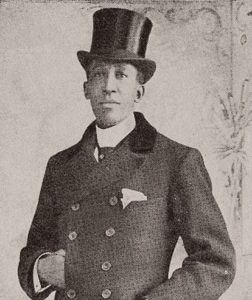
Sam Lucas
*Sam Lucas was born on this date in 1848. He was a Black actor, comedian, singer, and songwriter.
Samuel Mildmay Lucas was from Washington Court House, Ohio, the son of free black parents. As a teenager, he showed a talent for guitar and singing, and while working as a barber, his local performances gained him a reputation. In 1858, he began his career as a performer with the traveling Black minstrel companies.
Over the next five years, he sang and acted on stage and riverboats and composed music for his shows. Meanwhile, he found ways to integrate his Black roots into the mostly white form; for instance, his tune "Carve Dat Possum" borrowed its melody from a Black religious song. As Black minstrelsy grew popular with the general public, Lucas became one of its first celebrities, particularly known for his portrayals of pitiable, comic characters. His fame allowed him to choose his engagements, and throughout his career, he performed with some of the best Black minstrel troupes; he never led a troupe of his own.
Throughout his life, Lucas performed with Lew Johnson's Plantation Minstrels, Callender’s Georgia Minstrels, and Sprague’s Georgia Minstrels in Havana, Cuba. After his time as a minstrel performer, Lucas began to perform in vaudeville. Lucas was married more than once; in August 1886, he married his second wife, Carrie Melvin, in Boston, Massachusetts. She was a violinist, played cornet, and actress. They had one daughter together, Marie. The couple performed together in vaudeville, but they divorced in 1899. Marie Lucas became a successful pianist, trombonist, arranger, and conductor. Marie and her father later worked together.
In 1898, he performed in Boston in A Trip to Coontown, produced by Bob Cole. This was the first Black production to use only African American writers, directors, and producers and the first black musical comedy to make a complete break with minstrelsy. In 1890, Lucas served as an end-man in Sam T. Jack's The Creole Show, often cited as the first Black production to show signs of breaking the links to minstrelsy. From 1905-06, he starred in Rufus Rastus, directed by Ernest Hogan. In 1097, Lucas starred in the second showing of an original musical comedy from Cole and Johnson, The Shoe-Fly Regiment, which ran from June 3, 1907, to August 17, 1907, at the Grand Opera House in New York City in the summer of 1907 and at the Bijou Theatre in New York. The Shoe-Fly Regiment was a three-act musical, with Acts One and Three taking place at the Lincolnville Institute in Alabama and Act Two in the Philippines.
Lucas played Brother Doolittle, a member of the Bode of Education. Lucas later performed in another original musical comedy, The Red Moon, from May 3, 1909, to May 29, 1909. In 1908, he became a charter member of the professional theatrical club The Frogs, and in 1913 he participated in The Frog Follies. 1913, Lucas was featured in the unfinished film Lime Kiln Field Day. The footage of the unfinished film was assembled in 2014 by the Museum of Modern Art, which had rescued the film cans from a Biograph film storage vault in 1938.
In 1914, Lucas revived his role as Uncle Tom in the film adaptation of Harriet Beecher Stowe's Uncle Tom’s Cabin. He is generally credited as the first black man to portray Uncle Tom, a character typically played by white actors in Black Face. This silent film was an inductee to the 2012 National Film Registry list. After completing Uncle Tom's Cabin, Sam Lucas, believed to be 67 years old, died from pneumonia after suffering from liver disease for many years on January 5, 1916. James Weldon Johnson described him as the "Grand Old Man of the Negro Stage."